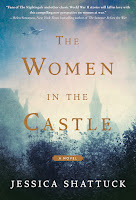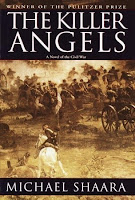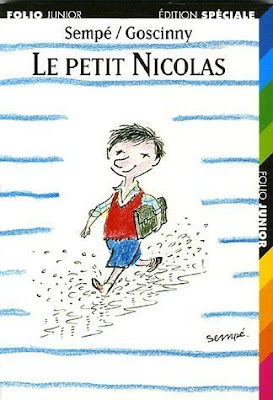Back in the time of the Great Depression (1935-1944) the Farm Security Administration commissioned photographers to capture images of what was happening around the country, especially as it related to the Great Dust Bowl. Roy Stryker was the head of this photography project and he had his own ideas of the kinds of photos he wanted and didn't want. If a photographer sent him the negatives of something he didn't want, he would hole-punch the negative so it could never be used behind his back. In 2018 an exhibit of these altered photographs was made public called "Killed Negatives: Unseen Images of 1930s America."
 |
| One of the "killed" hole-punched photos |
These killed negatives came to represent one aspect of lost memories in Karen Russell's brilliant book, The Antidote, where families impacted by the dust bowl, racism, poverty, and even murder, sought refuge from memories that made them feel bad or were too big of a burden to carry.
In the Antidote, the hole-punch sense of something missing is represented by a prairie witch known as Antidote. This woman is a "vault" where people can store their memories. “I will take whatever they cannot stand to know,” the Antidote thinks. “The memories that make them chase impossible dreams, that make them sick with regret and grief. Whatever they hope to preserve in the future. Whatever cargo unbalances the cart. . . . Horror, happiness, sorrow, regret—pour it all into me." And when the people are ready, she can return the memories to the people, like money saved in a bank, returned to a patron when needed for some project or bill.
The story is set in Uz, Nebraska, a fictional town named for the place where Job in the Bible lived. It also have several references that bring to mind "The Wizard of Oz." There was certainly an over-the-rainbow sort of feel to the story with magical things happening all the time, or in the oddest of times. In addition to the Antidote, there was Cleo, a photographer hired by Roy Stryker. But when her camera was stolen she found another perfectly good camera in a second-hand store. But this new camera, the Graflex Speed Graphic camera, had the ability to capture of photos from both the past and future of the land, as if the land itself had a memory and could see where things would end up. There was also Harp, a humble farmer whose land flourished even though all of his neighbors lands were dying and blowing away. His niece, Dell, a teenager who was mourning the death of her mother and her unsolved murder. There was also a scarecrow (of course there was) who seemed to have some memories which would return to him in snatches.
The events in the story start around the time of two actual events: Black Sunday when it seemed like all the dirt in the world was whirled up into the air and thrown about and the Republican River Flood of 1935. (No rain. No rain. No rain. Too much rain. Sound familiar?) The folks in the book, like the real people living in the midwest in the 1930s, were forced to admit that the farming practices they employed weren't working and were in fact the cause of the great dust storms. It is a hard thing to admit one is wrong.
I was completely blown away (pun?) by The Antidote. My husband and I listened to the audiobook as we drove through Eastern Oregon on the way to and from his 50-year class reunion. Both of us were amazed at the way Russell was able to draw together so many threads, bringing the past forward into the present. For example, at one point in the story, which doesn't adhere to a strict chronological timeline, Harp's father is recalling why he and his family had to leave Prussia (Poland) because of the terrible and discriminatory acts done to his people by the Germans. When he came to America, he found Whites doing the same sort of things to the Indians. He even became complicit in some of the racism toward Indians, even starting a rumor that undoubtedly led to innocent people being murdered. Instead of learning from his own experiences he covered up his memories by visiting "the vault", transferring his memories to her so he could blissfully go on with his life. If we don't learn from history we are doomed to repeat our mistakes.
In an interview with BookPage, author Karen Russell, said she wanted to write a story where an apocalyptic future for us isn't a foregone conclusion. “You can’t imagine a viable future, a world that’s kinder and more just than what we’ve got going today, without returning to the past,” Russell says. One of the solutions is to look back on the past and learn from successful times, like the farming practices of the Pawnee, the original people of Nebraska, which were not destructive to the environment. Today many school districts are removing any teaching about topics which will make the dominant culture feel bad about themselves: slavery, treatment of indigenous people, climate change. It is as if we want to give our children a hole-punched history of America. Instead we need to embrace our past and learn from our mistakes, moving forward to a positive future for everyone, not just for those who happened to grab the biggest piece or best portion. In the book, Russell’s characters find themselves blessed with little miracles that force them out of step with the tradition of forgetting. “The emptiness of any place is an illusion,” Cleo says. “That’s what this camera has taught me. Any piece of earth is brimming over with living. I think this must be what the poets mean when they write in the fullness of time." Hopefully, it is not too late for us. Hopefully a lot of people read this book and take to heart it's message of hope for a positive future.
Of all the books I've read so far in 2025, this one is by far my favorite and the one I think is most worthy of some book award. We'll see if I am right.
My rating: 5 stars.
________________________________________________________
DISCUSSION QUESTIONS:
1. If you were to write a headline for a magazine/newspaper review of this book, what would it be. (Keep it to less than ten words.) Here are a few examples to get you started:
- NYT: Amid a dust storm and Depression, pioneers reap what they've sown.
- WaPo: Karen Russell's The Antidote is a dazzlingly original American epic.
- Chicago Review of Books: The Plurality of Ideas in Karen Russell's The Antidote.
- Guardian: A magical realist Dust Bowl tale.
- Lit Hub: What natural disasters can reveal about the human condition.
2. If the book is full of "plurality of ideas" what do you think are the three main points or themes of The Antidote? Can you narrow it down to three easily?
3. In what ways is The Antidote "dazzlingly original?"
4. Karen Russell identified four inspirations for the book. Explore examples for each of these inspirations:
- The book of "Job" in the Bible.
- Hole-punched "killed" negatives of photographs taken to show the impact of the Dust Bowl. (See information about this in my review above.)
- The Wizard of Oz
- Stories about the treatment of Indigenous People at the hands of immigrants/pioneers (relocation, Indian Schools, racism)
5. Prairie witches served as "vaults" for pioneers' unpleasant memories. Relate this experience to what is happening today in America with school districts removing topics like slavery/treatment of indigenous peoples/climate change from the curricula.
6. In an interview Russell said she used magical realism to tell the Dust Bowl story because it allowed her to creative and not too tied down to actual facts which could be criticized for accuracy. What magical aspects of the story did you appreciate? What aspects did you find distracting?
7. What memory did Harp recover from his Dad, which was being held by a Prairie Witch? How did this memory expand the story?
8. When Cleo points the Graflex Speed Graphic camera at a scene, the results never show what she is actually photographing. What does this magical camera actually capture? Why do you think Russell included these photos of past memories or future possibilities?
9. How important was the scarecrow to the story? Did you figure out who he was before it was revealed?
10. What aspect of this novel was the most poignant to you?
For more information: Take a look at the resources used to inspire this book here @Marmalade and Mustard Seed.
------------------------------------------------------------------------
At 432 pages this book qualifies for the Big Book Summer Challenge. My third big book of the summer, so far.
-Anne












































